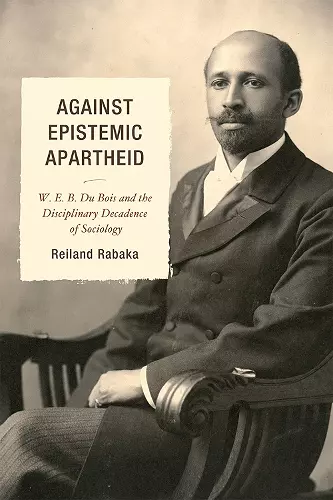Against Epistemic Apartheid
W.E.B. Du Bois and the Disciplinary Decadence of Sociology
Format:Hardback
Publisher:Lexington Books
Published:10th May '10
Currently unavailable, and unfortunately no date known when it will be back
This hardback is available in another edition too:
- Paperback£53.00(9780739145982)

In this intellectual history-making volume, multiple award-winning W. E. B. Du Bois scholar Reiland Rabaka offers the first book-length treatment of Du Bois's seminal sociological discourse: from Du Bois as inventor of the sociology of race to Du Bois as the first sociologist of American religion; from Du Bois as a pioneer of urban and rural sociology to Du Bois as innovator of the sociology of gender and inaugurator of intersectional sociology; and, finally, from Du Bois as groundbreaking sociologist of education and critical criminologist to Du Bois as dialectical critic of the disciplinary decadence of sociology and the American academy. Against Epistemic Apartheid brings new and intensive archival research into critical dialogue with the watershed work of classical and contemporary, male and female, black and white, national and international sociologists and critical social theorists' Du Bois studies. Against Epistemic Apartheid offers an accessible introduction to Du Bois's major contributions to sociology and, therefore, will be of interest to scholars and students not only in sociology, but also African American studies, American studies, cultural studies, critical race studies, gender studies, and postcolonial studies, as well as scholars and students in "traditional" disciplines such as history, philosophy, political science, economics, education, and religion.
Although the life and work of W.E.B. Du Bois have in recent years begun to receive the attention they are due, Du Bois's radical sociology remains largely unrecognized. Du Bois was not only a founder of the field and a radical practitioner; he was also a thunderous critic of sociology. He saw that the field's complacency in the face of human suffering, its collusion with oppression and its indifference to genocide, deeply undermined sociology's quest to understand social relationships and social structures. Against Epistemic Apartheid vindicates Du Bois as a theorist of an alternative sociology, a field oriented to the darker peoples of the earth, to women, to the urban slum and rural poverty, to the prison and the school. In the spirit of Du Bois, Rabaka questions the integrity of sociology. He understands Du Bois as an engaged scholar who, seeing the ways of power from outside, from the South and the East so to speak, developed an alternative sociology that we very much need today. -- Howard Winant, director, Center for New Racial Studies, University of California Santa Barbara; author, The World Is A Ghetto: Race and Democracy Since World War II
This is a powerful book! Professor Rabaka not only shows how DuBois produced against all odds an alternative epistemology to challenge the social scientific discourse of his period. And since the 'epistemic apartheid' remains firmly in place, we all would be well-served by understanding the DuBoisian episteme. -- Eduardo Bonilla-Silva, Duke University; author of Racism Without Racists
We, sociologists in particular, have long been waiting for deep scholarship on Du Bois. This book may well be the first of a new wave in that much-needed project—one that does more than make clever allusion to Du Bois' two-souls poetry. Against Epistemic Apartheid seriously examines the critical traditions from Du Bois to Fanon and Foucault that expose the disciplinary decadence of sociology and other of the human sciences. -- Charles Lemert, Andrus Professor of Sociology, Wesleyan University
Reiland Rabaka offers a much-needed critique of sociological technique and practice, and he proposes a corrective to the long-standing malicious negation of Du Bois’s prophetic and progressive sociological perspective.... As we come to the end of this book, we are left satisfied, convinced, and enlightened by the author’s characterization of Du Bois as a 'transdisciplinary human scientist and critical social theorist.' ... Finally, this volume is necessary reading for the newly reinvigorated interest in Du Bois’s contribution to sociology, history, philosophy, political science, economics, education, criminology, and religion. * American Journal of Sociology *
This book is well written and draws heavily from primary sources. Recognizing that Du Bois’ interdisciplinary approach to the study of society was first introduced at a time when sociology’s academic boundaries were being established and canonized, Rabaka argues that Du Bois’ social studies are transdisciplinary.... Providing a comprehensive overview of Du Bois’ extensive social discourse, Rabaka’s Against Epistemic Apartheid makes a significant contribution to the history of sociology, critical race theory, and Africana studies. * Contemporary Sociology *
ISBN: 9780739145975
Dimensions: 241mm x 162mm x 34mm
Weight: 823g
440 pages